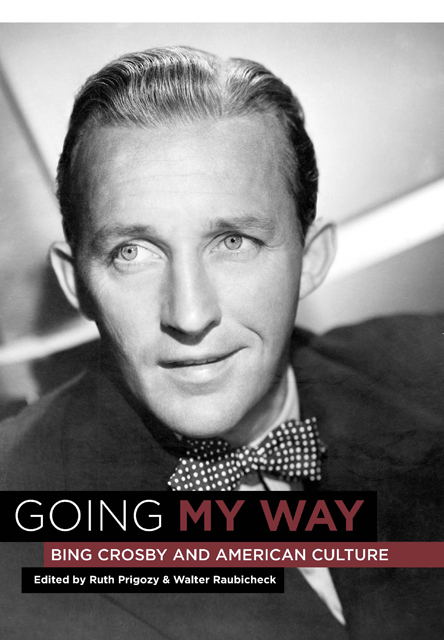Book contents
- Frontmatter
- Dedication
- Contents
- List of Illustrations
- Foreword
- Preface
- Acknowledgments
- Introduction Bing Crosby—Nothing Is What It Seems
- Part 1 Theoretical Perspectives on Crosby
- Part 2 Cultural Perspectives on Crosby
- Part 3 Historical Perspectives on Crosby
- Personal Comments
- Selected Bibliography
- List of Contributors
- Index
14 - Bing Crosby's Magnetic Tape Revolution
Published online by Cambridge University Press: 11 March 2023
- Frontmatter
- Dedication
- Contents
- List of Illustrations
- Foreword
- Preface
- Acknowledgments
- Introduction Bing Crosby—Nothing Is What It Seems
- Part 1 Theoretical Perspectives on Crosby
- Part 2 Cultural Perspectives on Crosby
- Part 3 Historical Perspectives on Crosby
- Personal Comments
- Selected Bibliography
- List of Contributors
- Index
Summary
Bing Crosby played a vital role in the development of entertainment technology. His financial backing of Ampex Corporation in the late 1940s led to that company's successful introduction in America of the German invention of professional magnetic tape recording, a fundamental technology that even today remains the basis for all broadcasting, audio and video production, and computer science. By helping launch an electronics revolution in communications, Crosby vastly transformed the world of show business, which he had dominated for so long, and in the process hastened the growth of American broadcasting.
A set of serendipitous events set this technological revolution in motion. The trigger was Crosby's increasing dissatisfaction with the demands of live radio. Starting in 1935, Crosby was the host of The Kraft Music Hall on the NBC radio network and transformed that weekly program into the premier musical variety show of the time. The demands of live broadcasting were many, including the need to perform each weekly program twice, once for East Coast and Midwest audiences, and again later for the live West Coast feed. “Live” meant no chance to correct mistakes; embarrassing and even career-damaging bloopers went right out to millions of listeners. Production values were limited by what the cast and crew could do in one live take.
By 1945 Crosby desperately wanted a change from the rigors of live radio. Rumor had it that if he was forced to continue doing live broadcasts on NBC or on any other network, Crosby would quit radio altogether and concentrate on films and records, two media at the time, both of which allowed for retakes and editing. The two major radio networks, NBC and CBS, insisted on producing live broadcasts. Since the networks’ inception, they had banned the playing of recordings on the air because the audio quality couldn't match live sound. Crosby had reached an impasse and seemed to have no choice but to go live on the air if he wanted to remain on network radio. NBC, CBS, and the other radio networks had the last word, or so it seemed.
- Type
- Chapter
- Information
- Going My WayBing Crosby and American Culture, pp. 151 - 158Publisher: Boydell & BrewerPrint publication year: 2007



